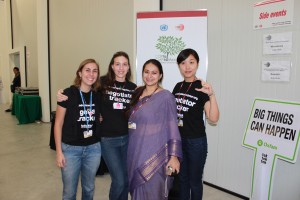A basic meeting of minds

The BASICs group (Brazil, South Africa, India and China gave a press briefing last night and seem to be as closely linked as their Adopt a negotiator trackers)
The four members of the BASICs group, which was established in 2009 to advance the interests of Brazil, South Africa, India and China (all large, growing economies), reaffirmed their alliance and their non-negotiable requirements for reaching a climate change deal at a press conference in Cancun yesterday.
Their joint call for the development of an adaptation framework, the advancement of urgent actions for mobilising and providing finance to developing countries, mechanisms for technology development and transfer and forestry-related actions, and ambitious mitigation commitments and actions, including MRV/ICA of such commitments and actions, reflected aspects of their desire to reach a balanced package climate change agreement.
Wondering what that’s all about? Here’s a translation in English.
We need to build an adaptation framework:
The effects of climate change are already evident and things are going to get worse. In the coming years, communities around the world will have to find ways to adapt to rising sea levels, water and food insecurity, and more extreme weather events than we are used to.
Poverty makes the ability to deal with climate change effects much harder. Measures have to be put in place to help communities adjust to the effects of climate change. These communities will need money and assistance. If negotiators can agree to a framework for such a plan, this would give the world a direction in which to move to build a climate-resilient future.
We need finance for developing countries:
If developing countries are going to grow their economies to improve the lives of their citizens, and avoid pumping large quantities of greenhouse gas into the atmosphere, they are going to need cash. The technology required to transition away from our dependence on oil and coal towards low-carbon economic growth is expensive. To be more precise, $30-billion is needed for start-up finance and $100-billion will be needed every year by 2020.
There is much debate around who should contribute to this fund, whether it should be public or private and who should manage it.
For more information on which countries are contributing and which are benefitting, see the (fasttrackfinance) site.
We need mechanisms for technology development and transfer:
We require a plan in order to share skills, knowledge and new technologies that will help us to deal with the challenge of climate change, which some countries have, but others do not.
We need ambitious mitigation commitments and actions, including MRV/ICA of such commitments and actions:
MRV stands for measurable, reportable and verifiable. In other words, mitigation projects need to be measurable, reportable and verifiable, so that parties (countries) can judge whether or not other parties are fulfilling their obligations and can determine the extent to which emissions are being reduced globally.
Some countries have objected to this, notably China, feeling that it is too invasive. Nevertheless, the BASICs group is committed to transparency and accountability, and is currently working on a draft document of an international consultation and analysis (ICA) process.
The Basics group commented yesterday that they are committed to the ICA process and have a plan in mind for how it might be structured. However, the group maintains that the process must be anchored in a multilateral process.
The three imperatives identified by the BASICs group as the hopes for Cancun include agreement on finance, technology transfer and securing the second commitment period for the Kyoto Protocol (KP). Key countries, in particular Japan, have expressed their intention to not agree to a KP second commitment period, creating something of stalemate withing the process. The group argues that the KP is the effort of long-term negotiations and has made its contribution to efforts to combat climate change and should continue to contribute to the process. As such, they hope that Japan will reconsider and commit to the second period under the KP.
The BASICs group posits that Annex 1 countries (developed countries) who are not part of the KP, will need to look at making binding commitments under the LCA track, while developing countries should adopt voluntary commitments.




About the author
Laura Tyrer
Laura Tyrer is a climate-change activist based in Johannesburg, South Africa. She has an honours degree in philosophy, with a particular interest in environmental ethics. As a former journalist, Laura is seeking to highlight the broad spread of considerations that need to be taken into account in Africans climate change agenda.





